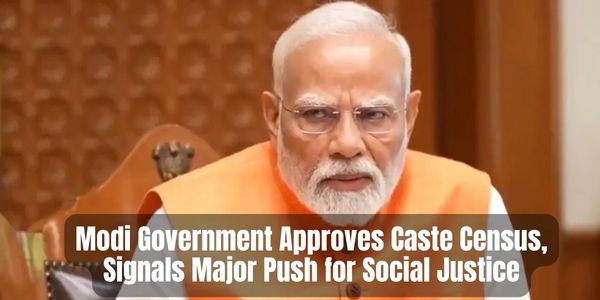Historic Move Announced
In a groundbreaking step, the Indian government has approved the inclusion of caste enumeration in the upcoming national census, slated to begin in 2025 and conclude in 2026. The decision, endorsed by the Cabinet Committee on Political Affairs (CCPA) under Prime Minister Narendra Modi, addresses long-standing calls for comprehensive caste data to bolster social justice and welfare policies across the nation.
What is a Caste Census?
A caste census is a detailed exercise to collect data on the caste identities of India’s population, either as part of the national census or as a standalone survey. It maps the demographic distribution of caste groups, including Scheduled Castes (SCs), Scheduled Tribes (STs), Other Backward Classes (OBCs), and general categories. Unlike the decennial census, which covers population, gender, literacy, and economic indicators, a caste census provides granular insights into the social and economic conditions of specific castes. This data is crucial for designing targeted affirmative action policies, ensuring equitable resource allocation, and addressing systemic inequalities rooted in India’s caste system.
Must Read: The Unheard Voices: 15 Books That Expose India’s Caste Reality
Government’s Pledge to Unity and Transparency
Speaking at a press conference on Wednesday, Union Minister of Information and Broadcasting Ashwini Vaishnaw underscored the government’s commitment to inclusivity. “Under PM Modi’s leadership, the CCPA has decided to integrate caste enumeration into the census, reinforcing our dedication to strengthening India’s social and economic fabric,” Vaishnaw said. He emphasized that the census, a Union subject under Article 246 of the Constitution, is the most reliable framework for this exercise, dismissing state-level caste surveys as “unscientific” and politically motivated.
Political Reactions Across the Spectrum
The decision has sparked varied responses from political leaders. Home Minister Amit Shah hailed it as a “historic step” toward equitable policy-making. In Bihar, where over 63% of the population belongs to Extremely Backward or Backward classes, Chief Minister Nitish Kumar welcomed the move, stating it would “reveal caste demographics, aiding upliftment and development.” Deputy Chief Minister Samrat Choudhary and Union Minister Chirag Paswan also expressed gratitude to PM Modi, with Paswan calling it the fulfillment of a long-pending demand.
Must Read: Dr. B.R. Ambedkar’s Books: A Legacy of Intellectual and Social Revolution
Opposition Claims Credit
The opposition, particularly the Congress and its INDIA bloc allies, has claimed credit for advocating a caste census. Congress leaders, including Rahul Gandhi, have long argued that accurate caste data is essential for effective affirmative action and fair welfare distribution. However, Vaishnaw criticized the Congress, alleging it historically resisted such measures, pointing to the incomplete release of the 2011 Socio-Economic and Caste Census (SECC) data under their rule.
Implications for Politics and Society
The decision responds to growing demands for updated caste demographics, especially for OBCs, whose reservations in government jobs and education rely on the outdated 1931 census. Political analysts suggest this could reshape electoral strategies, particularly in caste-sensitive states like Bihar, with assembly elections looming. The caste census is expected to provide clarity on caste demographics, potentially influencing political representation and policy priorities across India.
Must Read: Poverty: A Persistent Challenge to Sustainable Development
Challenges on the Horizon
Despite the optimism, challenges remain. State-level caste surveys, such as Bihar’s 2023 exercise, have been criticized by the Centre for lacking transparency. In Karnataka, dominant communities like Lingayats and Vokkaligas have opposed similar surveys, alleging misrepresentation. These tensions highlight the complex socio-political dynamics surrounding caste data collection in India.
A Step Toward Equity
The inclusion of caste enumeration in the national census promises a clearer picture of India’s caste demographics, paving the way for fairer policies. As the country embarks on this sensitive exercise, the government faces the challenge of balancing social justice with national unity, navigating both opportunities and hurdles in this transformative journey.

